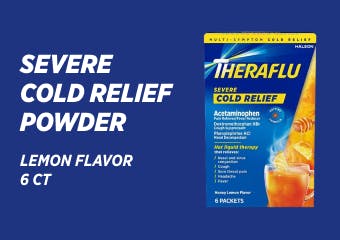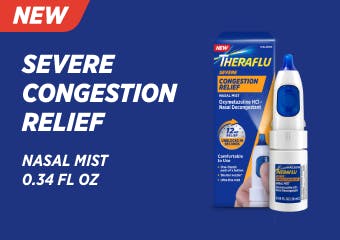Why Do I Have a Sore Throat and Cough in the First Place?
A sore throat is one of the most common symptoms of an upper respiratory infection.1 The average adult will experience 2-3 sore throats over the course of a year, with up to 80% of these instances being a result of different viruses like influenza, RSV and rhinovirus.1 The remaining 20% may be linked to Streptococcus bacteria.1
Meanwhile, the cough reflex is triggered by sensory nerves that pass signals to the brainstem.2 These forceful expirations of mucus, harmful vapors and other foreign matter is the body’s defense against mechanical and chemical agents that may be harmful.2
Since a sore throat and cough are typically unaffected by antibiotics, the availability of OTC treatments has become important for the management of symptoms and overall comfort of those who are suffering.1 These readily available treatments should be well-tolerated and should provide long-lasting relief of symptoms.1
How Do Throat Lozenges Work?
While there are a range of OTC treatments available to help manage the symptoms of a cough or sore throat, throat lozenges are considered one of the more effective methods, especially when compared to sprays and gargles.1 These medicated lozenges act by delivering active ingredients continuously to affected areas over a prolonged period of time.1
Ingredients in Cough Lozenges
Menthol is the primary active ingredient in OTC cough lozenges due to the fact that high concentrations of it can have an anesthetic and desensitizing effect.2 In some studies, menthol vapors were shown to reduce sensitivity to nasal irritation and may have other helpful effects on airway sensitivity.2
Many readily available lozenges for sore throat and cough contain glycerol, which naturally occurs in all living cells and has over 1,500 known uses thanks to its versatility.3 While it may be commonly thought of as a solvent, it’s a useful additive in antitussives thanks to its properties of sweetness and lubrication.3 Glycerol has demulcent properties, which means that it can relieve irritation and inflammation; it coats the pharynx and the inside of the throat.3 It also acts as a lubricant, reducing the friction that naturally occurs when the pharynx and tongue come into contact during speech and swallowing that can trigger a cough.3
Studies have produced evidence that sweet tasting things can suppress a person’s sensitivity to coughing, especially when compared to bitter tasting things.3 Sucrose is a commonly used ingredient in cough drops due to its sweetness and ability to decrease cough sensitivity.3 One study indicated that rinsing the mouth with a sweet sucrose solution increased cough thresholds by 45%.3 Other sweeteners have been hypothesized to reduce coughing as well due to natural analgesic properties, including crystalline sugar, chocolate and honey.2 Glycerol has a naturally sweet taste and is about 0.6 to 0.8 times as sweet as sucrose, another common ingredient in throat lozenges.3
Cause for Concern
There has been some concern in the medical community that excessive use of menthol cough drops may exacerbate a cough.4 The conclusions drawn by one study found separate associations between the severity of an individual’s cough and:4
- The amount of menthol in each lozenge
- Number of cough lozenges consumed on a daily basis
- Total amount of menthol consumed each day
This study did suggest that excessive cough drop use could be a contributing factor in the severity of an individual’s cough.4 Since mentholated lozenges are so widely available and frequently used in the management of persistent coughs, medical professionals recommend that individuals share their OTC sore throat lozenge history when seeking clinical evaluation for a severe cough.4
While there is a proven benefit to using lozenges to manage a cough and sore throat, the takeaway is not to overdo it. For better management of your daytime cold symptoms, reach for Theraflu Daytime Severe Cold Relief Hot Liquid Powder. Thanks to a powerful combination of medications, it can temporarily relieve symptoms of the cold and flu like:
- Minor aches and pains
- Cough due to throat and bronchial irritation
- Minor sore throat pain
Get your cough and sore throat under control so you don’t miss one minute of your day.





